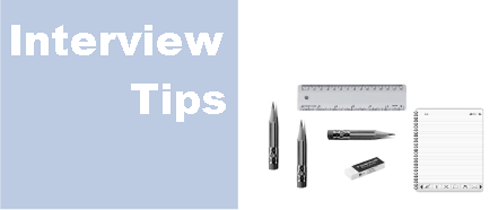
The following information is provided to help you be as successful as possible in your job interviews. Please refer to the section on ‘job interviews--do’s and don’ts on behavioural etiquettes and physical appearance.
Suggested further reading: Career Planning Guide: books on interview preparation and interviewing in the Career and Internship Office
Learn to make statements about yourself in these key areas:
Knowledge and Training
Example: B.S. degree in.......3.3 major GPA; projects completed
Examples: class projects; senior projects; volunteer work; employment
Present project or work titles and some specifics about the project
Examples: organisational; communication; leadership; computer; laboratory; mechanical; Present specific skill names such as x computer language and job titles such as School Open HOuse Committee Chair etc.
Examples: professional and personal; clubs, volunteer work, athletics, music
Present specifics e.g. Sing in Cal Poly Choir; Ran L.A. Marathon; Active in IEEE
(Short and Long term)
Examples: to join a certain co-op; to enter a project in competition; to participate in XX program; to become a certain kind of engineer
The best way to prepare for an interview is to practise with friends, relatives, or a Career Counselor. Using this checklist to prepare yourself prior to any interview situation will help you stay calm and focused during the session. Name 2 to 3 skills, abilities, or exemplars for each question.
An interview is a two way process; you are interviewing the employer while you are being interviewed. Spend some time thinking about what further information you need about the employer and the position. Good questions are ones that have been formulated through your own insight. Be sure, however, that your questions are not answered somewhere in the company literature or the job description.
You can interject your questions at any appropriate time during the interview.
The interviewer may signal that the interview is ending by asking whether you have any additional questions. If you do not have any concluding questions you may take this opportunity to summarise your valued to the employer and repeat your sincere interest in the position based on the additional information you gained during the interview. Before you leave the interview be sure to find out the next stop in the interview process. If the interviewer has not told you, it is appropriate to ask "When may I expect to hear from you?"